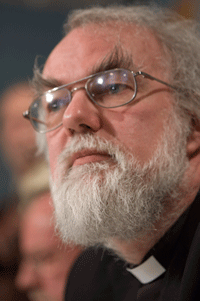Vatican concerns about how some recent decisions of the U.S. Episcopal Church will impact the search for full Anglican-Roman Catholic unity are echoed in a reflection by Anglican Archbishop Rowan Williams of Canterbury, the head of the Anglican Communion. Writing about the Episcopal Church's recent general convention in which it voted to permit the priestly ordination of non-celibate homosexuals, Archbishop Williams repeatedly referred to the need to keep in mind the ecumenical implications of local church decisions in addition to their impact on the unity of the Anglican Communion as a whole. Archbishop Williams' reflection, titled "Communion, Covenant and Our Anglican Future," was published on July 27. In a statement on July 29, the Pontifical Council for Promoting Christian Unity noted Archbishop Williams' concern for maintaining the unity of the Anglican Communion through common faith and practice based on Scripture and tradition. The Vatican office "supports the archbishop in his desire to strengthen these bonds of communion, and to articulate more fully the relationship between the local and the universal within the church," the statement said. "It is our prayer that the Anglican Communion, even in this difficult situation, may find a way to maintain its unity and its witness to Christ as a worldwide communion," it added.
Williams Expresses Concern for Anglican Unity
Show Comments (
)
Comments are automatically closed two weeks after an article's initial publication. See our comments policy for more.
The latest from america
July 16 marks 80 years since the first atomic bomb was detonated. The specter of nuclear annihilation has been with us ever since.
The first time we see the titular hero of James Gunn’s new film “Superman,” he doesn’t descend from the heavens. He plummets.
If we imagine ourselves as satisfying a God who will “give us” things only if we do the “right things,” then our relationship with God becomes less a friendship and more a chore.
For 13 years, Josep Lluís Iriberri, S.J. has guided pilgrims along the same trail St. Ignatius walked over 500 years ago.








